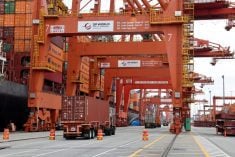SHANGHAI, March 2 (Reuters) – Top European pork producer Danish Crown hopes to gain a bigger chunk of the Chinese market by building a new factory to provide fresh meat to discerning consumers in Shanghai.
Plans for the US$42.44 million plant come as Hormel Foods of the United States prepares to open a new factory in nearby Zhejiang province in the third quarter, and after a year of record pork imports by the world’s top consumer of the meat.
While imports were driven largely by high Chinese prices, Danish Crown chief executive Jais Valeur said changing consumer habits have also created demand for premium products like Denmark’s lean pork, particularly in China’s most developed cities.
Read Also

Canadian trade data delayed by U.S. government shutdown
Canadian international trade data for September will be delayed indefinitely due to the ongoing partial shutdown of the United States government, Statistics Canada said Friday, Oct. 24.
“We see Chinese consumers demanding more quality, more insight into where the pig came from, what happened when it grew up in terms of animal welfare, the way it was raised, the way it was handled,” he told Reuters, citing feedback from supermarkets and foodservice chains already buying the company’s frozen product.
One of the world’s top exporters of pork, Danish Crown ships huge volumes of pig parts typically not eaten in Europe to China, including 75 million pig’s feet through last year, as well as more expensive cuts like hams and shoulders.
Customers including big hotpot chains and catering firms like the lean meat, colour and marbling and flavour of Danish pigs, said Valeur.
Growing demand for imported pork comes even as overall growth in pork consumption in China is expected to slow to less than one percent annually through 2020, according to Rabobank, with growth saturated in middle to high-income groups.
A local factory will allow Danish Crown to defrost imported pork and sell fresh, packaged meat and sausages to a niche market willing to pay more for high quality, convenient food.
The company is still seeking a suitable location for the plant that is expected to process about 10,000 tonnes a year of meat when completed in 2019.
Valeur expects China’s booming e-commerce platforms to be more important for the firm’s sales than traditional retailers, where the competition for shelf space is fierce.
Sales of fresh food online were estimated at US$14.55 billion in 2016, or about seven percent of China’s total fresh food sales, and are set to more than double by 2018, according to local research firm iResearch.
China’s e-commerce specialists, creating a “disruption” in retailing, have a sophisticated cold-chain, or a refrigerated supply chain to keep products fresh, in place, said Valeur, who met with online retailers last week.
Unlike China’s older generation who often touch a product to test its freshness, younger online shoppers will select meat based on its origin.
“When you go to home delivery, you look at the product in a different way, then it becomes more where did that product come from, than touching and feeling it,” said Valeur.
China is not yet ready for organic meat, a major part of Danish Crown’s business, believes Valeur, but there could be demand for pig meat raised without antibiotics, currently selling well in parts of the United States.
The factory will also speed up the firm’s response time, a key asset in a “high-speed market”, where people react quickly to online promotions, said Valeur.














